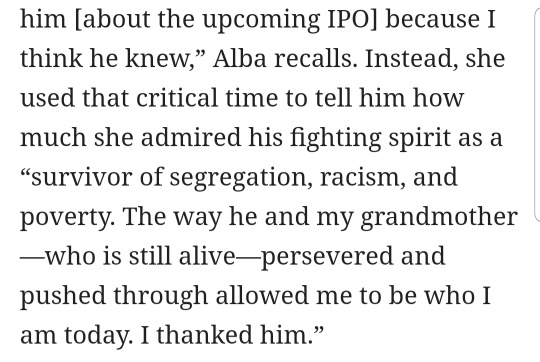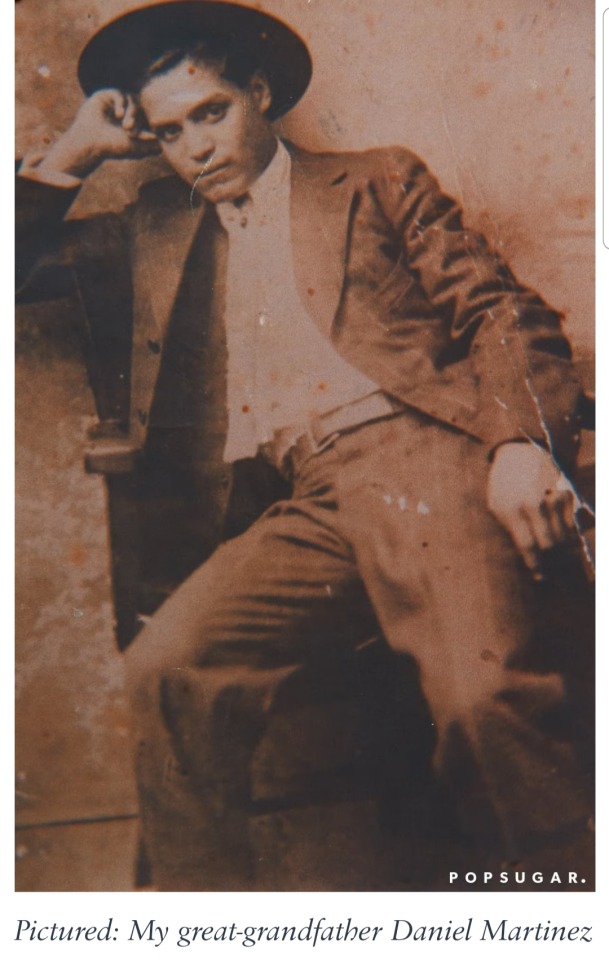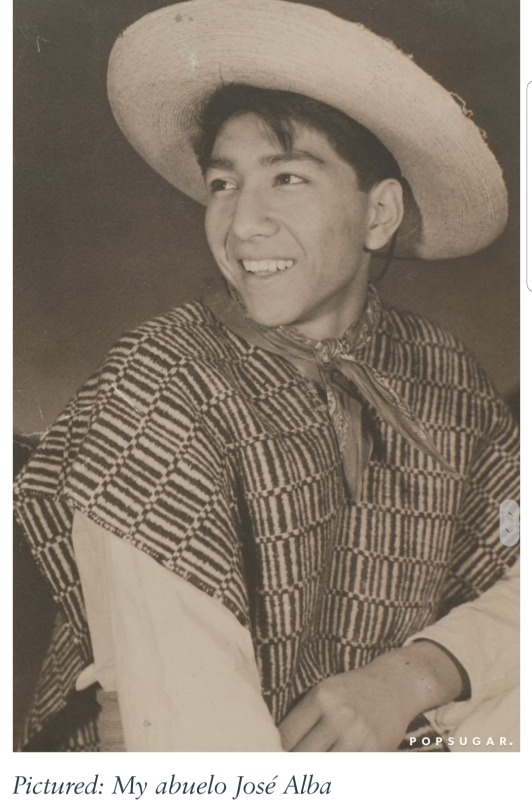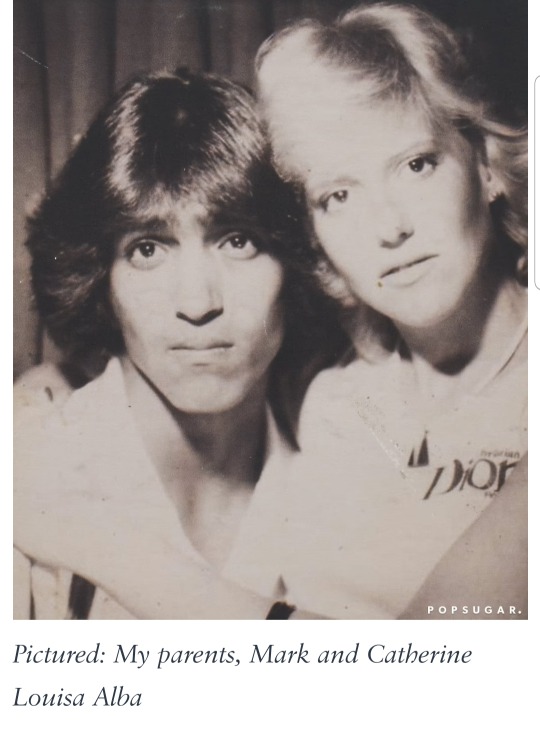#but the second part never comes which should be the one that acknowledges cas's contributions to the problems
Explore tagged Tumblr posts
Note
care to weigh in on the trap?
i thought the chicken was lovely
#replies#anonymous#i actually like the prayer scene in the trap#but i dont disagree with pk or arden#i would just prefer that instead of cas's confession in despair#we got what should be his half of the apology for the problems in their relationship instead#like i like the trap because it's the beginning of the conversation they need to have#but the second part never comes which should be the one that acknowledges cas's contributions to the problems#and i really dont like that
12 notes
·
View notes
Text



Growing up in California in my grandmother's house, surrounded by tías, tíos, and all my cousins, I always felt a deep connection to my Mexican-American roots. Every generation of my father's family has had incredibly different experiences that reflect much about American history.


My great-grandfather on my abuela's side, Daniel Martinez, grew up in Mexico and immigrated to Los Angeles. Eventually, he saved enough money to open a neighborhood market, which is where he met my great-grandmother, Guadalupe Miranda Martinez. She had come from Mexico to Los Angeles with her mother and brother as a young teenager. They soon married and began having children. When he lost his business in the 1920s, the family turned to migrant farm work. They were forced to use segregated water fountains and bathrooms and my darker-skinned tíos and tías were sent to Mexican schools, while those with light skin and blonde or red hair were allowed to attend schools with white students.

Unhappy with the segregated schools, my great-grandfather joined up with other families to open the East Barrio School for Latinos in Claremont, CA — fighting the status quo is part of my heritage! They taught reading and writing in Spanish and learned Mexican history at a time when it was hard to show pride about being Mexican.

My great-grandfather on my abuelo's side, Catalino Alba, came from Mexico during the Revolution. He met my great-grandmother when he immigrated to Gallup, NM, where he helped build the Santa Fe Railroad. He was a musician and inspired my abuelo José Alba to sing, practice traditional Mexican dance, and become an accomplished classical guitarist. As a child, there was never a family party where my abuelo didn't play guitar while my abuela, tíos and tías, and cousins sang along. Perhaps this is where I got my love for the performing arts!

My great-grandfather moved to San Bernardino, CA, to work on the railroad and my abuelo José Alba grew up in the barrio where he and his siblings slept head to foot. With little food at home, he often asked the neighbors for fruit from their fruit trees. He was compelled to eat dirt, which he later learned was a natural response to the lack of iron that he needed in his diet. As a kid, he wasn't allowed to swim in a public pool without a certification of vaccination. He would often get glass stuck in his shoes because the soles were so thin and worn out — he couldn't afford anything else. At one point, glass punctured his foot, and as a result he developed lockjaw, which was nearly fatal.
When he could work, he made money selling oranges and picking potatoes. He says the first thing he did when he had money was to go down to Main Street to have his shoes shined by a young boy. He told that boy that he would come every week because he knew he was trying to make his own way too.
There were 12 kids in the family and my abuelo is proud that his mom figured out a way to send them to school as soon as it was possible. She understood the value of education. Even though it was hard for them, she made it a priority.

This is my abuelo and abuela's wedding above — so classic. I always thought our ancestors were Spanish, but I learned through genetic testing that they were Native American, with roots that may go back as far as the Mayan civilization. We've been here from the beginning!

My parents, Mark and Catherine Louisa Alba, were so different . . . but they had the same hairstyle! I know that when my dad was growing up it was difficult for him and his parents to be Mexican-American. The hyphen wasn't an option back then.
My abuelo had only learned English when he transferred to grammar school at around 6 years old, and he was way behind as a result. Like many others of their generation, my grandparents didn't teach their children, including my dad, to speak Spanish. My abuelo says that he didn't even think about it, but I wonder if he associated it with a difficult transition in his life.
I want my girls to embrace their Latino roots, know how much we have contributed to this country, and understand that the road ahead is richer when we acknowledge and embrace our heritage. I want them to learn Spanish like their great-grandparents. I'm incredibly proud of my diverse heritage and I want my daughters to feel the same way.
Jessica Alba is something of a triple threat: She's managed to achieve major success as an actress, fashion designer, and business mogul. It's hard to imagine anyone not wanting to work with Alba, but early in her career she had a hard time getting roles because of her race.
"They couldn't figure out my ethnicity," Alba said. "I would always go out for 'exotic.' They were like, 'You're not Latin enough to play a Latina, and you're not Caucasian enough to play the leading lady, so you're going to be the "exotic" one.' Whatever that was."
Of course, Alba eventually ended up starring in hits like Fantastic Four, Into the Blue, and Good Luck Chuck. So, yeah, it's safe to say she proved those people wrong.
And not only is this actress leading by example; she's also taking steps to change the game herself. The creation of Alba's cosmetics line, Honest Beauty, which she founded as part of her brand, The Honest Company, in 2015, stemmed from her own struggles as a young girl trying to find a foundation that matched her unique complexion. "I didn't feel like, when I was younger, that there were a lot of things offered to women of color," she said.
So Alba went out and made her own. "The philosophy around starting this beauty line is about enhancing who you are instead of cover up and turn you into somebody else," she said.
Jessica Alba’s startup The Honest Company is a veritable success — approaching over $350 million in sales during a year in which many companies struggled — but venture capitalists turned up their noses to the idea at first.
In 2009, Alba had a real issue: She couldn’t find baby products for her newborn that were guaranteed to be safe and eco-friendly. After having an allergic reaction to one of the allegedly baby-safe detergents she bought, she developed her idea the same way many successful entrepreneurs get started: She pitched building the solution she herself wished was on the market.
Alba pitched serial entrepreneur Brian Lee on her idea, who reportedly passed after saying it wasn't “very promising.” The feeling that others don’t see potential in you or your business idea is a familiar frustration for budding entrepreneurs. At the time, Alba remarked that she felt nobody took her seriously as an entrepreneur, or even believed in her idea, even though she knew there would be demand.
But just five years later, The Honest Company reached unicorn status, valued at over one billion dollars. What changed in those five years that let her take her failed pitch to becoming a success story?
To perfect your pitch, experiment
Fast forward to 2012. Alba is now in Washington, lobbying for an update to reform the 1976 Toxic Substances Control Act. Buoyed by her growing knowledge on the subject, she went back to Lee and pitched him again.
This time, her deck was much more concise, down to less than 30 minutes from start to finish. In a world where most entrepreneurs give up after a rejection or two, Alba instead had spent the years between their two meetings pitching her idea to friends, getting holes poked in her positioning,and answering each and every supply chain question that arose.
Another change had happened over the last three years: Venture capitalists like Lee, whom she was pitching, had all started young families. Alba’s pitch was rock solid, and as an added bonus her prospective investors wanted the product themselves.
Lee said yes to the second pitch. The first year The Honest Company was in business, it reported an astonishing $12 million in revenue, a number that has only increased each year. After facing initial rejection on her pitch, Alba’s decision to persevere has led The Honest Company to dramatic success.
At first, everyone told Alba she should start with one product, then expand once that was successful. But this didn’t gel with Alba’s vision of a complete line of baby-safe products; the founder knew parents who wanted clean products wanted a brand that could provide multiple solutions.
Ultimately, Alba ignored the conventional advice and launched with 17 products, which many people believed was too many. But because she didn’t compromise on that, either to venture capitalists or herself, the launch was a total success.
Sources: (×) (x) (x) (×)
#🇲🇽#jessica alba#mexico#mexican#mexican american#latino#latina#hispanic#immigration#usa#united states#history#entrepreneurs#entrepreneurship#the honest company#los angeles#california#segregation#mexican history#East Barrio School for Latinos#claremont#claremont california#Santa Fe Railroad#new mexico#gallup#gallup new mexico#San Bernardino#maya#racism
7 notes
·
View notes